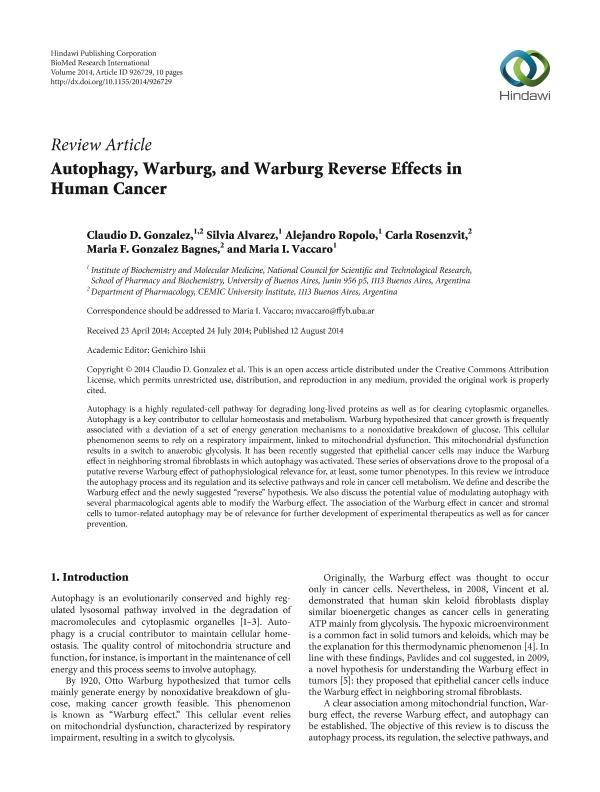Artículo
Autophagy, Warburg, and Warburg reverse effects in human cancer
González, Claudio Daniel; Alvarez, Silvia ; Ropolo, Alejandro Javier
; Ropolo, Alejandro Javier ; Rosenzvit, Carla; Gonzalez Bagnes, María F.; Vaccaro, Maria Ines
; Rosenzvit, Carla; Gonzalez Bagnes, María F.; Vaccaro, Maria Ines
 ; Ropolo, Alejandro Javier
; Ropolo, Alejandro Javier ; Rosenzvit, Carla; Gonzalez Bagnes, María F.; Vaccaro, Maria Ines
; Rosenzvit, Carla; Gonzalez Bagnes, María F.; Vaccaro, Maria Ines
Fecha de publicación:
08/2014
Editorial:
Hindawi Publishing Corporation
Revista:
BioMed Research International
ISSN:
2314-6133
Idioma:
Inglés
Tipo de recurso:
Artículo publicado
Clasificación temática:
Resumen
Autophagy is a highly regulated-cell pathway for degrading long-lived proteins as well as for clearing cytoplasmic organelles. Autophagy is a key contributor to cellular homeostasis and metabolism. Warburg hypothesized that cancer growth is frequently associated with a deviation of a set of energy generation mechanisms to a nonoxidative breakdown of glucose. This cellular phenomenon seems to rely on a respiratory impairment, linked to mitochondrial dysfunction. This mitochondrial dysfunction results in a switch to anaerobic glycolysis. It has been recently suggested that epithelial cancer cells may induce the Warburg effect in neighboring stromal fibroblasts in which autophagy was activated. These series of observations drove to the proposal of a putative reverse Warburg effect of pathophysiological relevance for, at least, some tumor phenotypes. In this review we introduce the autophagy process and its regulation and its selective pathways and role in cancer cell metabolism. We define and describe the Warburg effect and the newly suggested “reverse” hypothesis. We also discuss the potential value of modulating autophagy with several pharmacological agents able to modify the Warburg effect. The association of the Warburg effect in cancer and stromal cells to tumor-related autophagy may be of relevance for further development of experimental therapeutics as well as for cancer prevention.
Palabras clave:
Autophagy
,
Warburg Effect
,
Mitochondria
,
Cancer
Archivos asociados
Licencia
Identificadores
Colecciones
Articulos(IBIMOL)
Articulos de INSTITUTO DE BIOQUIMICA Y MEDICINA MOLECULAR
Articulos de INSTITUTO DE BIOQUIMICA Y MEDICINA MOLECULAR
Citación
González, Claudio Daniel; Alvarez, Silvia; Ropolo, Alejandro Javier; Rosenzvit, Carla; Gonzalez Bagnes, María F.; et al.; Autophagy, Warburg, and Warburg reverse effects in human cancer; Hindawi Publishing Corporation; BioMed Research International; 2014; 926729; 8-2014; 1-10
Compartir
Altmétricas



